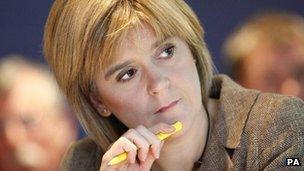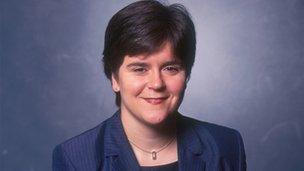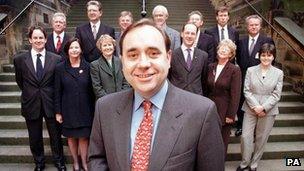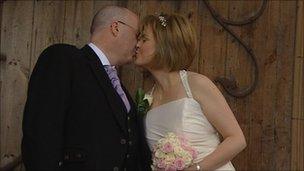Profile: Nicola Sturgeon
- Published

Nicola Sturgeon was health secretary for five years, and was popular in the role
Nicola Sturgeon was born in the North Ayrshire town of Irvine in 1970, and grew up during "the dark days of the Thatcher era," as she later told journalists.
By her own admission she came from an ordinary background, with supportive parents who encouraged their daughter to aim high.
She was educated at Greenwood Academy and joined the SNP at the tender age of 16.
Ms Sturgeon's English teacher was a Labour councillor and assumed his pupil would also join the party, because of her interest in politics and antipathy for the Tory government.
When he handed her a membership form, she said it was the catalyst for joining the Nationalists.
"I thought: 'Stuff you, I'm going to join the SNP'," she said in an interview.
The 42-year-old's family were not overtly political when she was growing up, although her mother now serves as an SNP councillor for North Ayrshire. But she later learned her grandfather had been an SNP member in the 1960s.
The young party member got her first taste of political campaigning in the 1987 election, and soon afterwards embarked on a law degree at the University of Glasgow.
Her first job was a solicitor at Drumchapel Law Centre in Glasgow, but it did not detract from her political activities.
She first stood for election in the 1992 general election, as the SNP's candidate in Glasgow's Shettleston constituency. She was the youngest parliamentary candidate north of the border, although she failed to win the seat.

Sturgeon initially combined her legal career with her political activities
The next general election, in 1997, saw Ms Sturgeon selected to fight the Glasgow Govan seat for the SNP.
Boundary changes meant that the notional Labour majority in the seat had increased substantially. However, infighting between Mohammed Sarwar and Mike Watson, the two rival candidates for the Labour nomination, as well as an energetic local campaign by the SNP, resulted in the seat being the only one in Scotland to see a swing away from Labour in the midst of a UK-wide Labour landslide.
Ms Sturgeon stood for the same constituency - Glasgow Govan - in the first Scottish Parliament elections in 1999, and in 2003.
She failed to win on both occasions but was elected after being placed first in the Glasgow regional list.
Love blossomed
The MSP was elected to the SNP's national executive, and was appointed the party's spokeswoman for health, education and later for justice.
In those early days in parliament, she had a reputation for being overly serious and later said in an interview: "When you're younger you take yourself far too seriously. Particularly being a young woman in politics where you feel a pressure to be taken seriously. If I was honest I was probably a bit po-faced."
There was a flurry of excitement in Holyrood in 2003 when it emerged that love had blossomed between Ms Sturgeon and Peter Murrell, the SNP's chief executive. The pair first met 15 years previously at an SNP youth weekend in Aberdeenshire which Murrell had organised, and married in 2010.

Sturgeon has been a key member of the SNP team since the Scottish Parliament's inception in 1999
Ms Sturgeon's leadership ambitions were clear; in 2004 she announced that she would also be a candidate in the forthcoming election to lead the party, with Kenny MacAskill as her running mate for the depute leadership.
However, Alex Salmond later announced he intended to stand for the leadership. Ms Sturgeon withdrew from the contest, declaring her support for Mr Salmond, and standing instead as his deputy. They were elected to the roles in September 2004, the start of long and fruitful political pairing.
Another high point came in 2007, when Ms Sturgeon won the Glasgow Govan constituency from Labour. It was an iconic seat for the SNP, with the victory equalling Margo MacDonald's by-election win in 1973 and her husband Jim Sillar's triumph there in the 1980s.
It coincided with a bit of a turnaround in the public and media perception of Nicola Sturgeon. The formerly earnest, slightly severe, political operator began to adopt a different demeanour, and had more of a common touch, according to commentators.
Although denied by Ms Sturgeon, there seemed to be an image revamp as well as a slight change in her public persona. She later put this down to a greater confidence in her abilities, and being more relaxed than she had been 10 years previously.

Nicola Sturgeon and Peter Murrell married in 2010 and now live in Govan
After her historic victory in Govan, Ms Sturgeon was handed the health brief and deputy first minister position.
Salmond and Sturgeon made a formidable double act, with the first minister often lauding his deputy, admitting that she had given him some "pretty stern advice" over the years.
As health minister she was well regarded by health professionals, and popular with the public who seemed to admire her businesslike approach. She brought in well-received policies such as the abolition of prescription charges and hospital car park charges.
Ms Sturgeon was at the front line of the SNP's historic Scottish election victory in 2011, when the party secured an overall majority in the Scottish Parliament.
She later described the result, and the dismantling of Labour strongholds across the country, as having broken the mould of Scottish politics. She said the SNP won because it was "in touch with the country it served".
Some five years after taking on the health brief, Ms Sturgeon has now been given another equally significant role - overseeing the independence referendum.
After the reshuffle was announced, she told the Holyrood chamber that she was ready to make a "positive and upbeat case" for independence and she looked forward to winning the referendum in 2014.
- Published5 September 2012
- Published5 September 2012
- Published5 September 2012